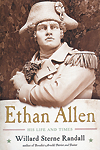
Ethan Allen: His Life and Times, by Willard Sterne Randall, W.W. Norton, New York, 2011, $35
Remembered by history as the Patriot hero who captured Fort Ticonderoga from the British, Ethan Allen was, in fact, a great deal more. In his new book, Ethan Allen: His Life and Times, author Randall gives us an Allen who was an accomplished writer and propagandist, a philosopher, a legendary frontiersman and a lifelong champion of personal liberty. He was also a canny politician, a shameless self-promoter, a voracious land speculator, an outlaw (a New York court condemned him to death in absentia) and a brawler who was banished from two New England towns for being too free with his fists and his tongue. In his 51 years the larger-than-life Allen helped build a nation and was vital to the annexation of Vermont as the nation’s 14th state.
Randall’s Allen is a robust and irrepressible figure. Never one to mask his beliefs, he made fast friends and intractable enemies. Allen was also a prolific and popular author. After spending nearly three years as a prisoner of the British—a nightmarish experience that Randall describes in chilling detail—Allen published a moving account of his sufferings. His book, which inspired many Americans to support the Patriot cause, became an overnight bestseller, second only to Thomas Paine’s Common Sense.
In addition to presenting a multifaceted portrait of Allen, the author does a thorough job of describing an America in the throes of the Revolution, and in the process he corrects many commonly held misconceptions. For instance, the first militiamen to brace the British at Lexington and Concord were not simply “embattled farmers,” as Emerson would have it; many were “well-officered,” British-trained veterans of the French and Indian War. And Allen’s famed Green Mountain Boys, portrayed in earlier texts and lore as a small band akin to Robin Hood’s Merry Men, were in fact the largest paramilitary force in North America, initially raised to fight not the British but the “Yorkers” intent on seizing the territory that would one day become Vermont.
It is remarkable that no one had written a scholarly, comprehensive account of Allen’s life—until now. Randall has penned a balanced and exciting study of the original Green Mountain Boy and the roiling times in which he lived.
—Ron Soodalter




